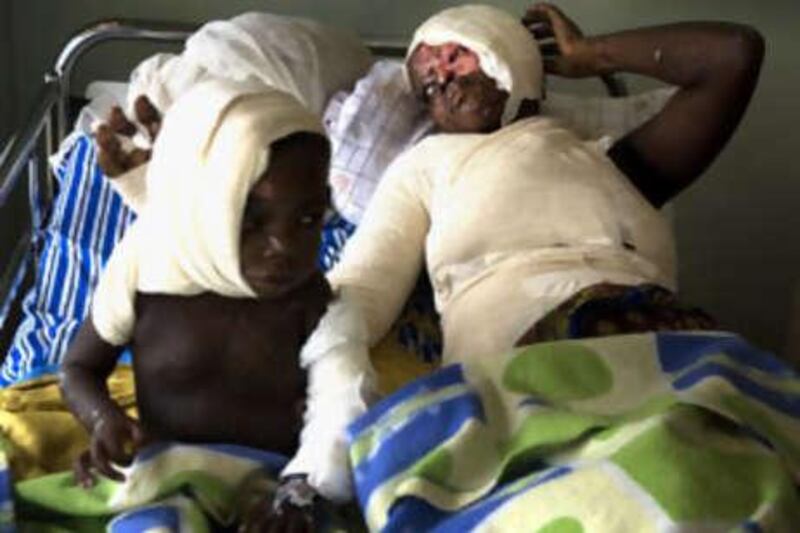KAMPALA // Regina Nannono may have survived a brutal acid attack, but her skin did not. The 25-year-old woman's face and most of her upper body were turned into pink, rotting flesh - and she is only one of a growing number of acid victims in Uganda. White gauze covers Ms Nannono's breasts, arms and stomach. Her face is raw and exposed, with one eye swollen shut. Next to her sits her two-year-old daughter, Aleni, massive bandages wrapped around her head.
"I first thought the acid was hot water, but the pain went on for too long. All I could feel at the time was fear," said Ms Nannono, sitting on a bed in the burns unit of Kampala's Mulago Hospital. "The pain is no longer as bad as it was, but it's still there." One evening last April, the young mother, who has three other children, was at home with her family. Their door was kicked in by a man who first splashed her brother-in-law with acid. He, however, escaped with minor injuries.
The assailant then followed Ms Nannono, who had run into the room of Aleni, her youngest child. He poured lethal acid on both of them. If the skin is not quickly doused with water, acid can go on killing skin cells for up to six weeks. Ms Nannono, like most victims in Uganda, did not know this, and so a black, hardened layer of burnt skin formed, preventing immediate treatment. She says she never even had a chance to see her attacker.
"I was very scared and distressed for my child. She was innocent in all of this," said Ms Nannono, feeding Aleni juice from a plastic bottle. She thinks her assailant was a spurned suitor, but she cannot prove it. Mulago Hospital says there has been a steady increase in the number of acid victims since early last year. Three to five patients have come into the burn unit most months since 2007, compared with one or two every quarter previously.
Most of the burns cases used to be accidental; now, many are deliberate. "We are now hearing of pre-planned attacks where victims are waylaid on their way home or even at home," said Christina Namatovu, a doctor in Mulago's burns unit. "Sometimes the assailants are known, but many times, for fear of retribution, the victims do not see their attackers." The most common motives for the disfiguring assault? "Love and property," she said.
Ex-spouses, romantic rivals and competitors for inheritance of property are often the assailants, and most of the victims are women. This was corroborated by Afan Kasingye, a police commissioner who heads a special committee set up in response to the acid attacks. "We have noticed an increasing number of attacks with acid, notably with the use of concentrated hydrochloric acid," he said. "Unfortunately, people think they can sort out their domestic and social relationship problems by disfiguring their victims."
Sarah Nabwami, 32, had not even heard of acid attacks until she was the victim of one in her own restaurant. "I was in my restaurant doing the dishes when someone walked past me and called my name. When I turned, he threw acid into my face," Ms Nabwami says, pulling her blue shawl tighter around her. Her eyes are burnt shut, and tears constantly trickle down her face. "The people who do this should be punished," she said. "Something has to be changed."
Ms Nabwami's assailant, who turned out to be acting on behalf of a jealous rival, was freed from jail after being fined 400,000 Ugandan shillings (Dh890). That was the extent of his punishment. He is not alone. Many attackers escape prosecution because of a lack of evidence or, if they are detained, suffer only light punishment. Containers of acid are readily available for sale at car garages in Uganda, with no questions asked.
Mr Kasingye, however, said his committee was attempting to change this and push for controls on the import and sale of acid in Uganda as well as for changes in the law. So far, a registry has been opened to record who is buying acid - and in what concentration - from dealers at petrol stations and car garages. But until the punishment for acid attacks becomes more severe, he said, preventing them was an uphill battle.
As reports spread about acid attacks, "awareness has been a double-edged sword," Dr Namatovu said. "More people are learning of acid as an available method. But previously, people disfigured by acid would stay at home to treat themselves if they survived long enough. Now more people are coming to the clinic." As for Regina Nannono, she says her sole focus now is helping her daughter Aleni cope with life as an acid attack survivor.
"I'd like my child to live a normal life. I don't know what kind of scarring there will be, but I hope she will be accepted." * Agence France-Presse





